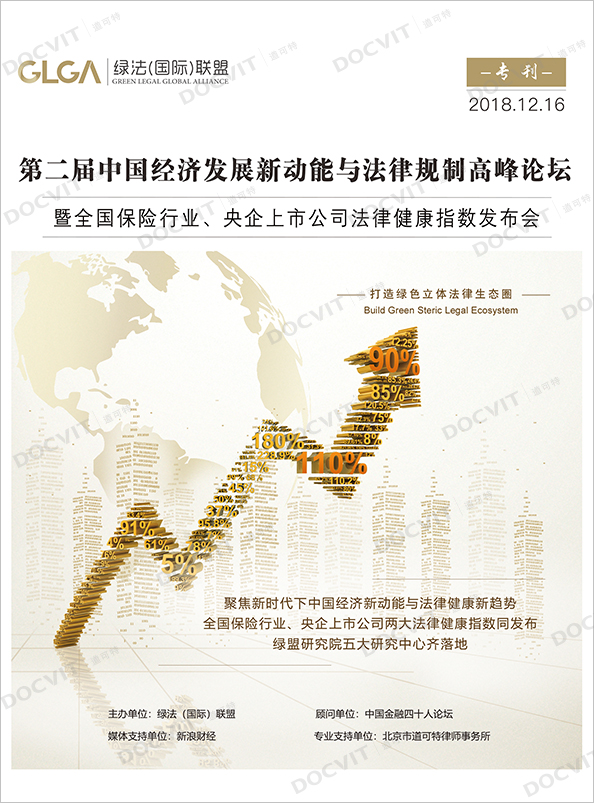Great Idea: Decode the Mode of DOCVIT: We only do two things: how to consider for customers (IV): Make lawyers’ service deeper
Source: DOCVIT Law Firm Time: 2018-12-03 10:03:33 Author: LIU Guangchao
Introduction: On November 3, 2018, Small and Medium-Sized Law Firm Development Forum sponsored by Shanxi Lawyer Association was held in Taiyuan, where LIU Guangchao, Director of Beijing Docvit Law Firm delivered the speech themed by “Decode the Mode of Docvit: We only do two things - & Ultimate Mission in the Management of Law Firms”. In this speech, LIU Guangchao emphatically introduced that DOCVIT only does two things in the management of DOCVIT, namely, how to consider for the lawyers and how to consider for the clients. The editor summarized the speech of Director LIU Guangchao at the forum and formed a series of articles Decode the Mode of Docvit, hoping to explore with peers.
All of you may have been the perennial legal consultant of an enterprise. Let’s start the topic here.
The perennial legal consultant of an enterprise is the easiest and the most difficult work for a lawyer.
Let's first take a look at how did lawyers A, B, C and D be a perennial legal consultant of an enterprise:
Lawyer A: He is 30 year-old. He worked in a law firm after graduation from college. He worked very hard and had excellent performance. After seven years of hard work, he has been promoted from an assistant to a partner of the law firm. The law firm has implemented the lump sum system, under which partners work for themselves without communication and cooperation. Lawyer A's annual income has increased from RMB 500 thousands to about RMB 2 million. At the beginning, he had no assistant. After that, with the growing of the business volume, he applied for an independent office and hired several assistants and applied his own WeChat Official Account. He worked as the perennial legal consultant of 5-8 units, most of which are small and medium-sized private enterprises. He was busy with business every day. After signing the contract with the customers, he assigned the work to the assistants and developed new customers. He told his assistants that he was in charge of marketing, and that the assistants were in charge of services. The relationship with the consultant units must be well maintained. For customers which renew the contracts after expiration, the assistant for maintaining the relationship will be awarded. Over the past few years, his performance has increased slightly, had new customers and lost old customer every year. He felt tired, but thought that it might be what it’s like to be a lawyer.
Lawyer B: He is 56 year-old and worked in the judicial system. Being a lawyer for more than 20 years, he has been a partner in a commission system law firm. It is an old law firm with a more traditional and loose management. Lawyer B had once been all-powerful. He is getting on in years without developing businesses. He has a dozen perennial legal consultant units, all of which are old customers. He hardly ever goes to the office. He hired a lawyer as assistant who will help him to handle necessary processes. For consulting matters of customers, contract needing modification or small cases needing agent, basically, the assistant handled them firstly. For important matters or significant cases, he would go to see the customer himself or with his assistant, to meet with the customer’s leaders, chat with them, and determine the keynote. He rarely appeared in court and only conducted guiding and coordinative matters. He has good customer relationship. Most customers also renew their contracts with him every year, without change in the cost. He has the annual income of RMB 2-3 million. He may accept a large case occasionally. He enjoys the status, plays golf more than 50% of the time every year, and often travels at home and abroad with his wife.
Lawyer C: He is 38 year-old. He is a partner in a business department of a comprehensive law firm. The system of the law firm is relatively eclectic. All partners need to choose a business department and have considerable autonomy in the internal management and distribution of the business department. The business department at which Lawyer C works has 5 partners, 12 lawyers and 8 assistants. Partners within the department have a professional division of labor, without strict restrictions. The 20 members of the team are managed by five partners and bear the costs separately. He does everything with the business volume of about RMB 3-5 million, about a dozen of consultant units from central enterprises to private enterprises. Lawyer C divided all consultant units into two groups. The basic business was maintained by two lawyers with an assistant respectively. Lawyer C was responsible for handling important things and visiting customers regularly. At the end of each year, there was a legal consultant to summarize the work of each customer. After few years, he has good business growth trend with the renewal rate of consultant units above 80%. He handled some cases or projects with other partners in the business department, even in the law firm in each year. He feels all right, but he feels that the effect of the law firm has not been fully played.
Lawyer D: He is 43 year-old and a core partner of a purely law firm under corporatization. The law firm has about 120 professional staff, with 30 partners, 50 lawyers and an assistant team with 40 members. It is divided into 6 departments. The partners must choose their professional direction. The lawyers and assistant teams are assigned to each department for management (there will be rotation of posts in the early stage). However, all the teams are not attached to a partner or a department. The cost of the whole team is shared by all partners of the law firm, and the distribution is based on the point-counting system. Lawyer D only engages in real estate business and is the head of the real estate department, which has 5 partners and 20 team members. His annual income is about RMB 20 million, with 2/3 from real estate business, 1/3 from other businesses. He has about 30 consultant units. His work mode is: He divided 30 consultant units into three parts, with one part being maintained by himself with the assistance of other team members, one part being maintained by other partners in the department, and one part being maintained by the senior lawyers guided by him (Later, the fourth part was divided, which is the consultant units being maintained by partners and teams outside the department). A service team is established for each consultant unit, which involve him and is responsible for the whole-process monitoring, achieving information symmetry. The team will hold customer service summary and analysis meeting every month, insist on providing training to each consultant unit every year, actively issue legal advices and risk warnings, give sample contracts, push industry legal information, etc.. There is also a legal risk assessment survey report for each new customer. He will issue a work report of legal consultant at the end of each consultant year, visit and express appreciations to customers for several times per year. In these three years, the renewal rate of the consultant unit has been 100%, and more than 50% of the consultant unit fees have increased. The average annual total lawyer fees generated by each unit has also increased. The total business volume has increased by about 20% every year. Lawyer D believes that such mechanism and service are good for the law firm, the customers and himself.
It is not hard to see that the four lawyers are divided into two major types. Lawyer A and Lawyer B are working in a commission law firm, who provide services with personal center. Lawyer C and Lawyer D are working in a law firm under corporatization or a department under corporatization, who provide services with the team center. Lawyer A and Lawyer B are different. Lawyer A is a typical entrepreneurial state, as busy as "a grandchild"; Lawyer B is a typical preservation state, living like “a god”. Both Lawyer C and Lawyer D are in the golden years of their careers. They seem to be in a larger department, but also different. Lawyer C still does everything. Due to the obvious boundary of businesses, teams and costs of the department, the service is still limited to a small team. Although Lawyer D is only engages in the professional area with all businesses under development. As a result of professional division of labor, business cooperation and team sharing, services to customers have basically realized the big team work. Lawyer C is working in a large law firm, becoming a medium partner; Lawyer D is working is medium law firm, becoming a large partner.
These examples may be integrated, but have prototypes in reality. Let's see what their customers say:
A customer of Lawyer A said: Lawyer A is excellent, but too busy. When talking about cooperation, he was very diligent. But after that, I never saw him. His assistant is very good in attitude, but poor in performance. Now, on account of that our scale is small, we can hire him due to small cost without objection. We may not hire him if he is still under such status when we have development. The point is, he's too busy to have time to study our industry or understand our model.
A customer of Lawyer B said: Lawyer B is our old partner. He has engaged in many classic cases in our company (system). Our cooperation with him has become a kind of inertia. He understands our corporate culture, and cooperates with us well. In recent years, however, we clearly feel that Lawyer B has been gradually "astringent". His law firm doesn’t have (arrange) good partners to undertake our business. Our trust to him hasn’t evolved into the trust to his law firm. Therefore, we will slowly adjust our cooperation strategy with him, entrust him with some businesses requiring experiences and resources. But some businesses requiring expertise and teams will no longer be entrusted to him. If he leaves the law firm, our cooperation with the law firm will be stopped.
A customer of Lawyer C said: The law firm at which Lawyer C works is large. His team is also good. We cooperate with them without decision risk. As long as there is no big problem, we will continue to cooperate him without any problem. However, the large scale of the law firm is unrelated to him. For several times, we wanted them to send several partners of different majors to work on a project at the same time, but the response time was slow. For another time, we tried to request them to send seven teams of lawyers for due diligence at the same time, but they didn't. Therefore, we ended up giving that business to another law firm which set the team on the same day. He is the main leader of all business. Although he has a team. We do have concerns.
A customer of Lawyer D said: We had a great time working with Lawyer D and his law firm. They impressed us with two points: firstly, it seems that the whole law firm is working for us. From cooperation to now, we have contacted more than a dozen of their partners. Lawyer D does what he is good at, and he is an organizer of other businesses. He has done a good job in external connection and internal integration with us, which has saved a lot of attention and opportunity costs for us. Secondly, they are really thinking for the enterprise, and provide in-depth services actively. Don't underestimate the risk warnings and industry information, from which we can feel that they are studying our industry, thinking about our business model, protecting our interests and even integrating into our corporate culture. The only disadvantage is that it is expensive.
At this point, we probably understand what customers think and hope. If you think their thought is right, just comply with their thoughts. If the current practice can't satisfy our customers, we can just change ourselves.
In the final analysis, the following four points of lawyers can judge whether the lawyer’s service is in-depth:
Whether they serve for the industry rules of customers?
Whether they serve for the business model of customers?
Whether they serve for the legitimate interests of customers?
Whether they serve for the core culture of customers?
It is right for focusing on the four points. If not, it could be wrong and dangerous.
If we want to change lawyers' service to customers, we have to change the thinking mode and behavior mode of lawyers, which shall start from changing the management mode and mechanism of lawyers. We have known the situation of the above-mentioned four lawyers and feedbacks of their own customers and then let us understand feelings, difficulties, wishes or ideas of such four lawyers.
Lawyer A: Our mechanism is free, but has obvious problems, namely, we dare not employ employees when there is no any business, but the employees are not insufficient when there are some businesses. And good talents cannot stay at our firm. And the ability in the business cannot be improved. And I ever thought about changing a job, but I did miscellaneous works over the years and am not specialized enough. Therefore, I am worried about that there is less market business for me if I am employed by the firms with higher requirements in the specialization. I am very entangled.
Lawyer B: The group of us are beneficiaries of development dividend of the lawyer profession. I am very satisfied. I will serve as a layer for several years and then quit out of the lawyer profession. Therefore, I do not pursue for the cause. And I have put my feelings in the firm, and therefore, I cannot change a job. It is the only pity that I am not reconciled to quit out from the lawyer profession. If I worked in a law firm under corporatization with a good distribution mechanism for interests sharing, where there are many partners bearing my customers, we would continue to play our roles. That is wonderful!
Lawyer C: Our firm is under a large scale, which has two advantages, namely, advantageous for business and internal cooperation. But our film does not thoroughly implement the corporate system, with insufficient team integration and insufficient specialized division, and therefore, there are no real join forces, which is restricted by the distribution mechanism and the business mechanism. Moreover, such management mode will cause increasingly severe internal competition and interest conflicts under such large scale. If I had a choice, I would hope to work in a specialized law firm with proper scale, which is able to guarantee barrier-free cooperation in the whole firm and provide a good mechanism to guarantee it.
Lawyer D: The group of us resign from many firms and form the firm and we are fortunate to choose such a mechanism. We are bonded together in the cost, risks and interests, and therefore our hearts are bonded together naturally. We only need to make a good judgement on the partner admission. Actually, we are forced by the market. Now the customers require the firm is specialized, systematic, global and on a fair scale. Moreover, the apparent services have no any competitiveness, and the firm must provide in-depth services. Therefore, we have to do this. Under such mode, our management cost will be high, and we can't do anything about it.
Let us imagine, what changes will happen if Lawyer A or B works in the firm where Lawyer C or D works, or the law firms at which Lawyer A or B even C works is changed to the law firm at which Lawyer D works?
……
I hope I have made the problem clear.
At least we have thought it logically.
Therefore, our Docvit has always been following such firm where Lawyer D works.
Relevant Recommendation
Great Idea: Decode the Mode of DOCVIT: We only do two things: how to consider for customers (V): Make lawyer services more valuableGreat Idea: Decode the Mode of DOCVIT: We only do two things: how to consider for customers (IV): Make lawyers’ service deeperGreat Idea: Decode the Mode of DOCVIT: We only do two things: how to consider for customers (III): Make customers have more sense of gainGreat Idea: Decode the Mode of DOCVIT: We only do two things - How to consider for the clients (II): Make the clients have more sense of identity
May be interested
Series Product Line
MoreIndustry Research
More-
2018 Blue Book of China's Non-Performing AssetsBased on an in-depth study and research on the overall non-performing asset industry, Green Legal Global Alliance Research Institute and Beijing Docvit Law Firm jointly complied 2018 Blue Book of China's Non-Performing Assets with certain academic and public welfare, hoping to bring guidance to the industry and reflect the innovation of the non-performing asset industry itself. -
2018 Blue Book of Legal Health of China's Insurance Industry2018 Blue Book of Legal Health of China's Insurance Industry includes Part I Legal Health Index Report on Insurance Industry and Part II Special Legal Report on Insurance Industry. Among which, the Legal Health Index Report on Insurance Industry is the second report issued by Green Legal Global Alliance (GLGA) after it successfully issued the first Legal Health Index Report on Insurance Industry in 2018. The index can comprehensively and intuitively reflect the overall legal health status of the insurance industry in the past three years. -
Legal Health Index Report on National Insurance Industry (2015 - 2017)Legal Health Index Report on National Insurance Industry (2015 - 2017) is compiled by Green Legal Global Alliance (GLGA), with the Beijing Docvit Law Firm as the professional support unit. Under the guidance of an external team of experts, it is one of the series of research topics in the legal health index report of capital market industry. In 2017, Green Legal Global Alliance (GLGA) successfully released its first research achievement of the series of research projects in the legal health index report on capital market industry, that is the Legal Health Index Report on Private Equity Industry. Report on Insurance Industry Legal Health Index is the second research result of this research topic.
Director's Message
MoreFellow Program
More-
【Fellow Program I】
With the launch of the "Fellow Program", Docvit hopes to unite with the like-minded lawyers of the country to build a career platform and realize their career dreams together. "Fellow Program I" aims to recruit partners, business partners and executive directors for the Docvit Branch in China. -
【Fellow Program II】
"Fellow Program II" aims to recruit partners and lawyers for Docvit Headquarters and Beijing Office across the country and around the world to become what the industry, Docvit itself, market and clients want. -
【Fellow Program III】
"Fellow Program III" aims to recruit partners for national branches of Docvit nationwide and globally. Docvit's national and global development blueprints require more partners to draw together, and let us work together to create a respectable law firm.
-
Foreign PE in China
-
A Guide to GEM Listing Preparation and Operation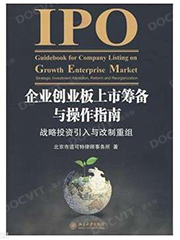
-
Unscramble PE in China 2nd edition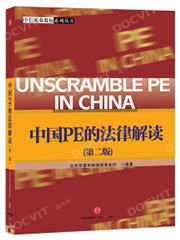
-
Deep Application of Limited Partnership in PE of China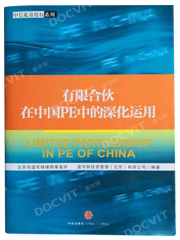
-
1st Forum on Development and Innovation of Chinese Law Firms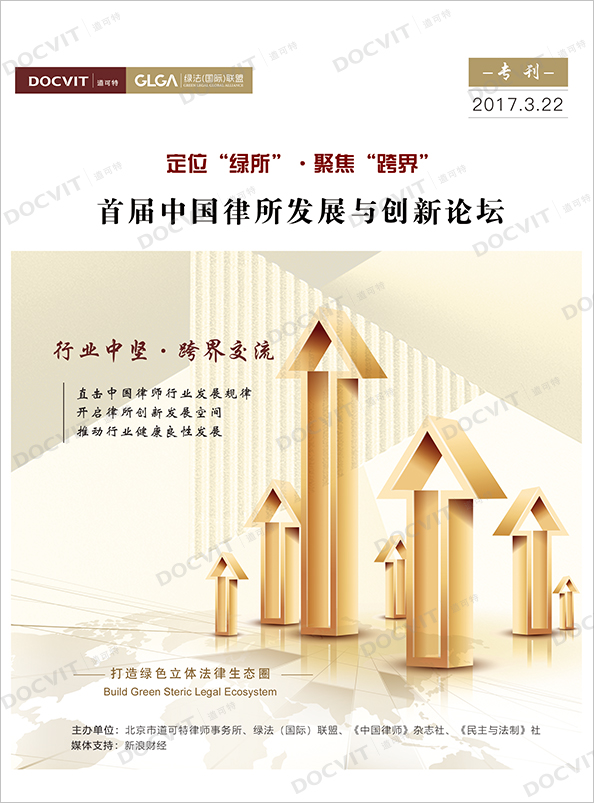
-
Forum on Private Equity and Asset Management in the New Regulatory Era and Release Conference of Legal Health Index of National Private Equity Industry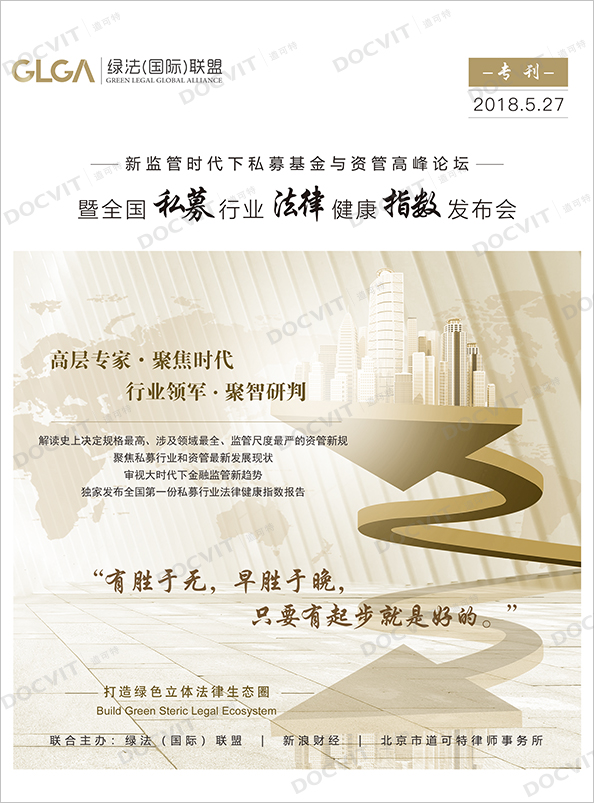
-
Release Conference of Blue Book of Legal Health of China’s Insurance Industry 2018 (Index & Special Reports)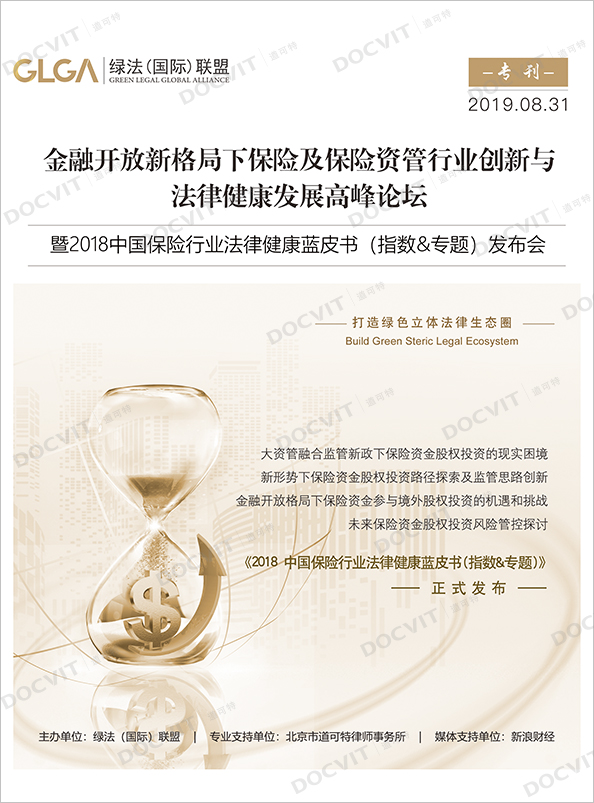
-
2nd Forum on New Driving Forces for China’s Economic Development and Legal Regulation and Release Conference of Legal Health Index of National Insurance Industry and Listed Companies of Central Enterprises